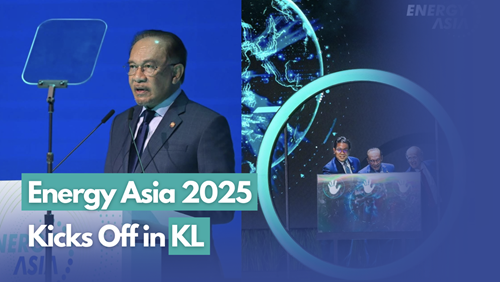June 17, 2025 | 22:01 (GMT+7)
Energy Asia 2025 kicks off in Malaysia
Energy Asia 2025 - a premier thought leadership and business advocacy forum, championing Asia’s pivotal role in the global energy transition - kicked off in Kuala Lumpur, Malaysia, on June 16, gathering over 4,000 delegates and 180 global speakers from 50 countries and territories to discuss the region’s energy transition.
Addressing the event, Malaysian Prime Minister Anwar Ibrahim noted that the Asia-Pacific region accounted for half of global energy consumption and 60% of greenhouse gas emissions in 2024. Despite this, regional countries, including eight of ten ASEAN member states, remain committed to climate goals, including net-zero emissions and tripling global renewable capacity by 2030.
    |
 |
|
Prime Minister Anwar Ibrahim highlights the need for equity and cross-border cooperation in Asia’s energy shift. (Photo: Indiplomacy News) |
PM Anwar stressed the need for clear financial frameworks to attract investment in renewable energy, especially as Southeast Asia received only 2% of global clean energy funding last year, despite vast potential in wind energy in Vietnam, hydropower in Laos, solar energy in Malaysia, and geothermal in Indonesia.
He emphasized modernizing regional power grids, citing ASEAN's progress on the ASEAN Power Grid (APG) and Malaysia’s own plans to invest 43 billion MYR (10.1 billion USD) in grid upgrades using AI and battery storage.
The Malaysian leader also warned that fossil fuels still dominate global supply and called for a fair energy transition that does not leave vulnerable populations behind. He said energy security must also ensure social equity and universal access.
The Association of Southeast Asian Nations (ASEAN) has developed a regional Carbon Capture and Storage (CCS) roadmap, and Malaysia recently passed the Carbon Capture, Utilization and Storage Bill 2025. The country is cooperating with over 10 international partners to position CCS as both a decarbonization tool and potential revenue stream, according to the PM.
Themed “Delivering Asia’s Energy Transition,” the three-day event features over 50 strategic dialogues, aiming to strengthen cross-border cooperation in clean energy deployment, decarbonization, and sustainable economic growth.
Source: VNA